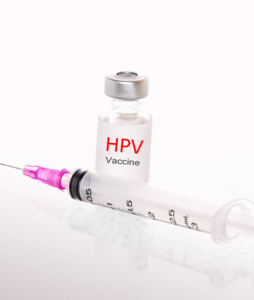The new 9-valent human papillomavirus vaccine, can potentially prevent 80 percent of cervical
cancers in the United States, if given to all 11- or 12-year-old children before they are exposed to the virus. The study also found the 9-Valent vaccine, under the trademark of Gardasil-9, has the potential to protect against an additional 8 percent of oropharyngeal cancers, which include the base of the tongue and tonsils. This disease is the second-most-common HPV-associated cancer.
In addition to protecting against 80 percent of cervical cancers, the new 9-Valent human papillomavirus vaccine, which includes seven cancer causing HPV-types, has the potential to protect against nearly 19,000 other cancers diagnosed in the United States, including anal, oropharyngeal and penile cancers.
In addition to protecting against 80 percent of cervical cancers, the new 9-Valent human papillomavirus vaccine, which includes seven cancer causing HPV-types — 16,18,31,33,45,52 and 58 — has the potential to protect against nearly 19,000 other cancers diagnosed in the United States, including anal, oropharyngeal and penile cancers. This is a 13 percent increase in protection against HPV-related cancers in comparison to the first vaccines on the market, Gardasil and Cervarix, which protected against HPV types 16 and 18.
These findings come from a seven-center study published in the Journal of the National Cancer Institute. The Centers for Disease Control and Prevention initiated the research effort, in conjunction with Cedars-Sinai.
“This is the first comprehensive study of its kind and shows the potential to not only reduce the global cancer burden, but also guide clinical decision-making with regard to childhood vaccinations,” said Marc T. Goodman, PhD, MPH, senior author of the study and director of Cancer Prevention and Genetics at the Cedars-Sinai Samuel Oschin Comprehensive Cancer Institute.
The study found the 9-Valent vaccine, under the trademark of Gardasil-9, also has the potential to protect against an additional 8 percent of oropharyngeal cancers, which include the base of the tongue and tonsils. This disease is the second-most-common HPV-associated cancer.
“We found that 70 percent of patient DNA tissue samples with cancer of the oropharynx harbored HPV,” added Goodman. “This is a much higher percentage of HPV than observed in other studies, likely because of changes in sexual behaviors, such as increased oral-genital contact.”
The 9-Valent vaccine was also found to potentially increase protection from other HPV-related cancers including those of the vulva, from 71 to 92 percent; vagina, from 73 percent to 98 percent; the penis, 76 percent to 90 percent; and the anus, 87 percent to 96 percent.
To compile these data, researchers examined 2,670 HPV DNA tissue samples from seven population-based cancer registries.
Study authors intend to perform additional research in the future to follow up on their estimate of how well the current vaccines protect against HPV-associated cancers.
Ramin Sarajari’s Comments:
Infection by genital HPV (human papillomavirus) is very common. At least half of people who are sexually active will contract the HPV virus at some point in their lives. Yet many will not know it and have no symptoms.
Whether symptoms occur or not can depend on the type of HPV virus involved in the infection. There are more than 100 types of HPV. Some HPV types are associated with genital warts, although the warts are not always visible.
This is an interesting development as HPV is a major challenge among the population and most of the time not detected until it is too late. The HPV vaccine contains no viruses and is not made from human papillomavirus. The active ingredients in the HPV vaccine are proteins that are similar to those found in the human papillomavirus. Genetically modified bacteria produce the proteins, which are then purified and mixed into a sterile, water-based solution.
It is recommended that all women ages 26 years and younger receive three doses of the HPV vaccine. Also all men ages 21 years and younger receive three doses of the HPV vaccine. It is an option for all men, but is recommended for men who have sex with men or who have a compromised immune system (including HIV) who are ages 26 and younger.

